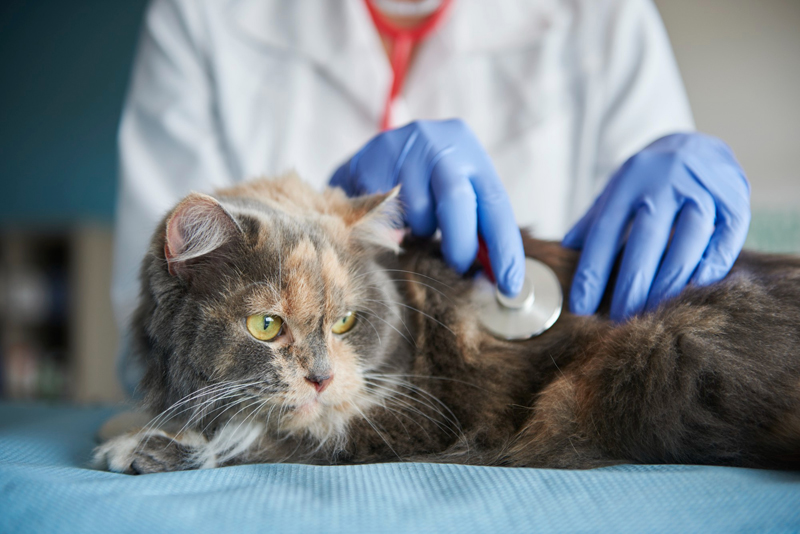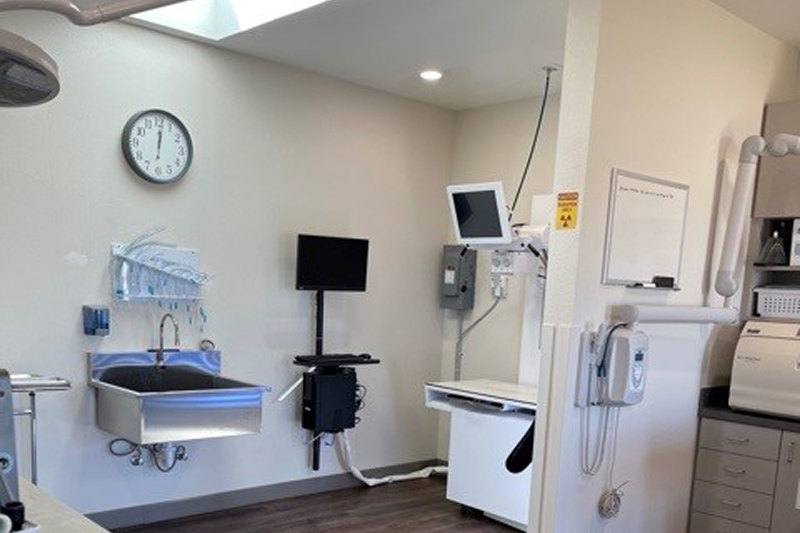Animal Hospital of Bentonville
Pet Diagnostic Care
Pet Diagnostic Care
When your pet is sick or injured, they can’t tell us what’s wrong. At Animal Hospital of Bentonville, our trained professionals can help get to the heart of the problem and get your pet on the road to recovery.

Pet Diagnostic Care
A thorough physical exam and history (symptoms you’ve noted at home) are the first important steps.
If the diagnosis is not immediately evident, your veterinarian will recommend specific diagnostic tests.
These may include:
- Laboratory testing for baseline blood counts and organ function tests, or infectious disease. Blood and/or urine samples may be collected from your pet, for point-of-care testing, or reference lab tests. Point-of-care tests are done on-site in our hospital to determine results and make treatment recommendations in the most timely fashion possible. In other cases, lab samples may need to be sent off to off-site laboratories (reference laboratories) – when the test cannot be performed with in-hospital lab equipment, or when the test results are not needed urgently.
- Imaging such as x-rays or ultrasound, which allows diagnosis of conditions of the heart and lungs, gastrointestinal obstruction, tumors of the internal organs or bones, fluid in the chest or abdominal cavity, urinary stones or gallstones, reproductive diseases, and bone/joint disorders. For most patients, gentle restraint can be used for these procedures, however, in some cases, sedation may be necessary.
- Microscopy is quite useful in the evaluation of lab samples such as ear swabs, skin impressions and scrapes, and needle biopsies of tumors. These tests are helpful in diagnosis of dermatologic and otic (ear) conditions.
- Ocular conditions may warrant evaluation for tear production (Schirmer Tear Test), corneal injuries (fluorescein stain), or abnormal intra-ocular pressures (Tonometry).
Diagnostic testing is an important step in the development of a treatment plan for your pet, allowing your veterinarian to most effectively target the underlying problem(s) and assess the probability of successful treatment. Your veterinarian can explain the purpose of each diagnostic test for your pet, and help prioritize which tests may be most helpful in determining the cause of your pet’s illness.

Digital Radiography
These images can help diagnose problems and conditions with the bones and joints, such as broken bones, swelling in the joints and other types of bone abnormalities. X-rays can also be used to diagnose problems with the internal organs, like the heart, lungs, spleen, liver and kidneys.
Digital Dental Radiography
We also offer full dental x-ray to evaluate the health of your pet’s teeth. They can also be used to find any other potential oral conditions your pet may have such as bone loss or tumors. This service can be completed while your pet is under anesthesia and during their dental cleaning.
Diagnosing Your Pet’s Ailment or Injury
Our veterinary staff can rapidly diagnose your pet’s injury or condition via x-rays and bloodwork. Once Animal Hospital of Bentonville understands the depth of your pet’s illness or injury, a treatment plan will be developed in order to help your pet heal and restore your pet’s health. If you have any questions or concerns about your pet’s health and his or her diagnosis, we would be happy to answer them and provide you with guidance in order to help make your pet comfortable during the healing process.
For more information on our radiology and diagnostic imaging services call us at 479-364-0340 today.

Pet In-House Laboratory
When your pet becomes suddenly ill, timely diagnostic test results are extremely important to help your veterinarian determine the best treatment plan. We have state-of-the-art in-hospital laboratory equipment capable of yielding lab results within minutes.
Baseline laboratory testing for your sick pet may include:
- Determination of blood cell counts: changes in white blood cell counts, red blood cell counts, and platelet counts can indicate problems such as anemia, dehydration, infection, auto-immune disease, and certain types of cancerous conditions
- Blood chemistry tests: these tests assess liver function, kidney function, blood sugar, blood proteins, calcium and phosphorus levels, and pancreatic function.
- Electrolyte tests: Sodium, potassium and chloride levels may be abnormal when your pet is dehydrated or having fluid losses through vomiting or diarrhea. Intravenous fluids and/or supplementation may be indicated when electrolytes are severely deranged.
- SNAP tests: point-of-care “snap” tests are available for certain infectious diseases such as Feline Leukemia and Feline Immunodeficiency Virus, Canine Parvovirus, Giardia, and Leptospirosis.
- Coagulation tests: these tests detect deficiency in clotting disorders, which can be present in cases of certain kinds of rodenticide poisoning and in severe liver disease/failure
- Microscopy: microscopic evaluation of bodily fluids including blood, urine; samples of skin and ear secretions, and needle biopsies of swellings or tumors can be performed in-clinic to assist in the diagnosis of systemic diseases, urinary disorders, skin and ear diseases, and differentiation of benign vs. cancerous tumors.
Our veterinary team will help explain which tests are most important for your pet. It is very important to us to include you in the decision-making process for your pet, so please don’t hesitate to ask a question if you need clarification.
